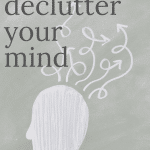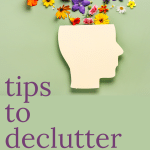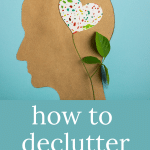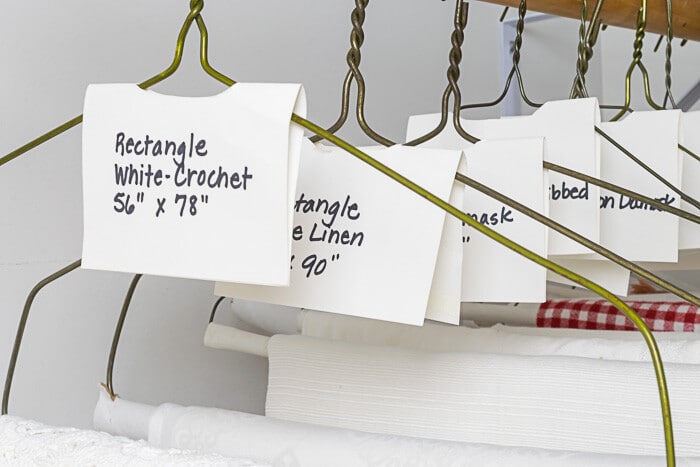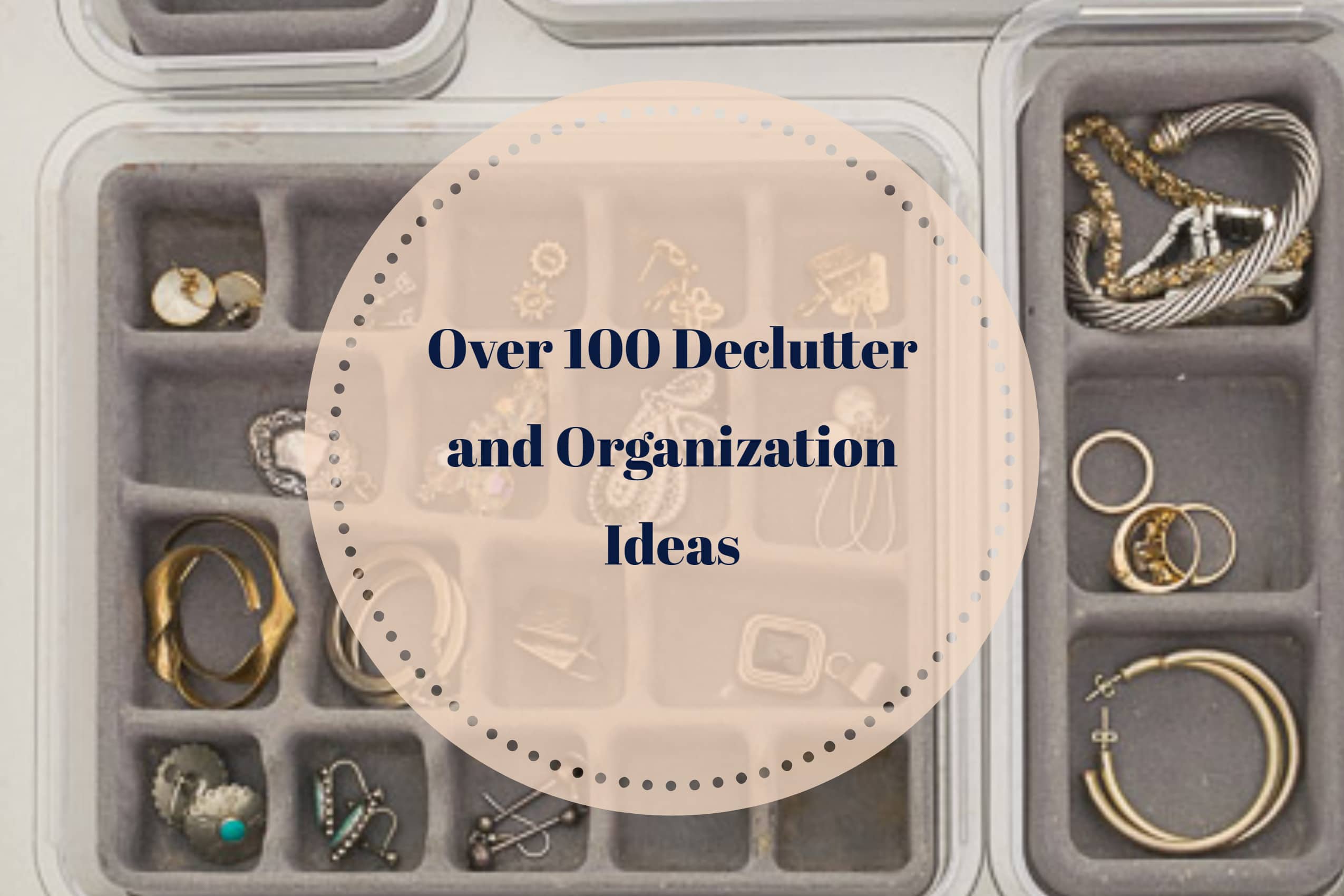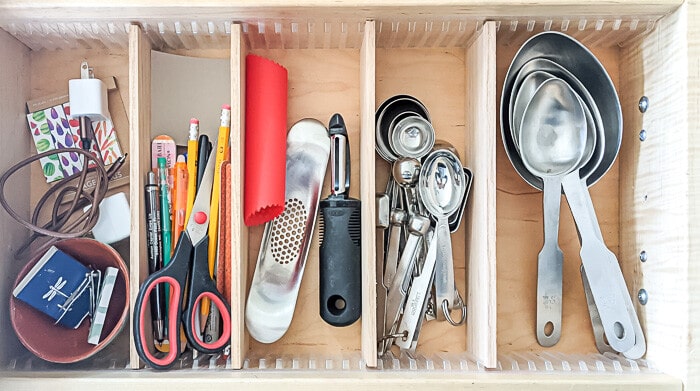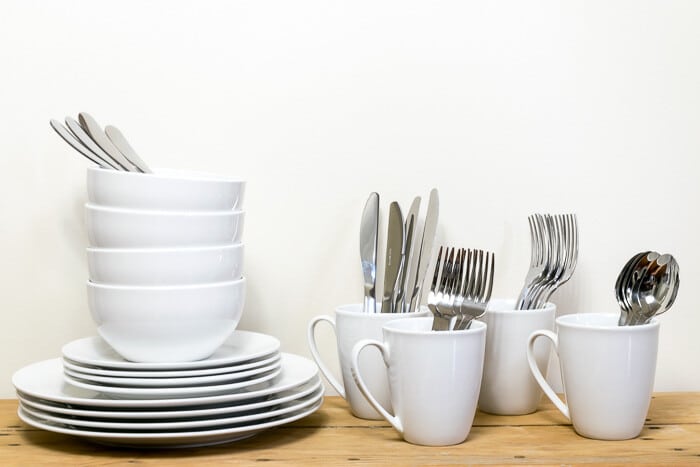Mental Clutter – Declutter Your Mind
This is the last post of the seven-post 2024 Declutter Challenge. We’ve spent the past six weeks assessing and tidying the physical clutter in our homes. This final addition to the series is perhaps one of the most vital regarding mental clutter.
If you’d like to start at the beginning of the Declutter Challenge, you can join it for free anytime. Pop over here to read all about what to expect over seven weeks of the Declutter Challenge, and join in the fun!

Table of Contents
what is mental clutter?
You’re likely familiar with physical clutter. It’s the stacks of old mail you still need to throw out, the little knick knacks taking up valuable space on your shelves, and the boxes of old clothes your children outgrew years ago. Of course, clutter is a regular part of life for most people. But perhaps you’ve never heard the term “mental clutter.”
That’s right—your mind can become just as chaotic as your house, office, or storage space. After all, it’s where your thoughts, emotions, and memories live. Just like physical clutter, it’s crucial to declutter your head when striving for a whole, healthy, and happy life.
Continue reading to discover the importance of decluttering your mind and precisely how to do it!
mental clutter is a lot like physical clutter
Mental clutter is much like tangible clutter; rather than cluttered items in your room, it’s thoughts in your mental space and mind. Your mind becomes overwhelmed with to-dos, tasks, unnecessary thoughts, negative thinking, memories, and emotions, making it challenging to function correctly. Mental clutter may make it difficult to focus on tasks, get motivated, and be productive. Unfortunately, it can even go as far as disrupting or negatively impacting your relationships and responsibilities.
examples of mental clutter:
Mental clutter comes in all shapes and sizes; it can be as simple as:
- What’s for dinner tomorrow night?
- I need to get the dryer vent cleaned.
- I need to get all those discards to Goodwill.
Or as complicated as:
- Information overload
- Fears and worries
- Unrealistic expectations
- Anxiety and anger
- A build-up of tasks you have yet to complete
- Shame or guilt
- Outdated ideas, values, and dreams
- Negative self-talk
- Unresolved issues/relationships
An excellent way to identify if you are struggling with a cluttered mind is when you realize you cannot control your rapidly changing thoughts. Here’s a perfect example of what this might look like in your head.
One moment you’re thinking, “I need to send that email to my boss.” And seconds later, your brain quickly moves to, “Did I take the trash out last night,” then, “the documentary I watched yesterday was so insightful,” and on to, “What dinner will I make for my family tonight?”
Whoa! No wonder we are exhausted!
how does mental clutter affect us?
Through the Declutter Challenge, you’ve learned how detrimental physical clutter is to your mental state. It’s the same with mental clutter.
How exactly does mental clutter harm your well-being? Below are a few of the many adverse effects of an overloaded brain. Mental clutter may:
- Cause anxiety
- Disrupt sleep
- Hinder focus
- Lessen productivity
- Decrease mental energy
- Increase or decrease appetite
- Lower motivation
- Promote forgetfulness
- Result in symptoms of depression
- Cause weight loss or gain
- Increases daytime fatigue
- Heighten outbursts of anger
- Provoke poor decision-making
- Lead to a lack of self-care
Honestly, the list goes on and on. Mental clutter also indirectly impacts your physical health over time. Heightened stress, a lack of sleep, and an altered appetite are considered direct effects. Mental clutter may also indirectly cause you to become ill easier, have less energy, and potentially experience heart problems or severe headaches.
It’s critical to realize that everyone reacts to a cluttered mind differently. Your personality and other traits affect how you handle overwhelming and racing thoughts. For instance, some people seemingly continue functioning well. However, there are always unfavorable results from the mental clutter they experience, even if they are completely unaware.
On the other hand, some people crumble under the weight. Their symptoms are more prominent and hinder daily tasks, relationships, and responsibilities.
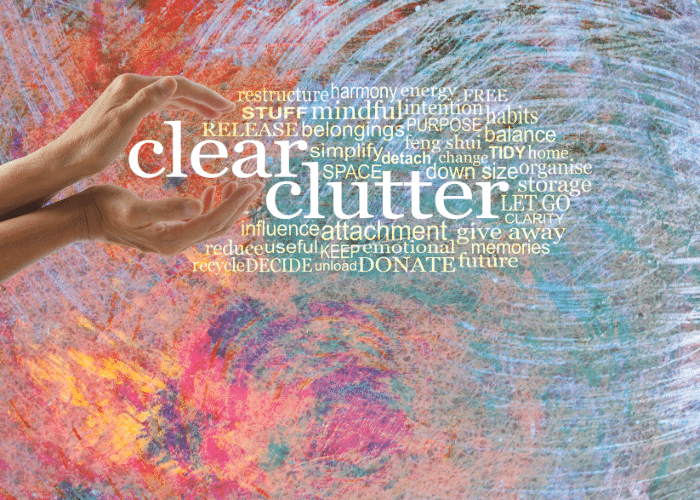
how to clear mental clutter
Getting rid of mental clutter is much like taking care of physical clutter.
you identify the mess, then decide what should stay and what needs to go.
Like with your living space, once your head is finally clear, you can make a realistic and attainable plan to avoid clutter in the future.
But, sadly, it isn’t as easy as checking things off a list as we dump them in a bag. It will take a bit more effort. However, the impact of a less cluttered and anxious mind is invaluable. So, where to begin?
identify your cluttering thoughts
Decluttering your mind starts simply—First, assess and identify the chaotic thoughts. This task is challenging for some individuals and almost effortless for others.
For those of us who aren’t so in tune with ourselves, it may require some structure and practice to discover what’s running through our minds. You just have yet to exercise this unique and powerful skill.
Whether you’re a pro at it or not, you can use one or a combination of the following tips to help identify what’s cluttering your mind:
tip 1 | sit quietly with your thoughts.
Choose a calming, quiet, and comfortable place to sit or lie down. After a few deep breaths, begin allowing your thoughts to flow naturally. Then, recognize what they truly are—just thoughts! They don’t have power over you. You are greater than the words, emotions, and memories trapped in your head.
Identify the most common subject matters of your inner dialog. Are many of them about work? Are they more about home life or family dynamics? Or are your thoughts weighed down with tragic memories?
Whatever the case, assessing and identifying the clutter is a key part of the process.
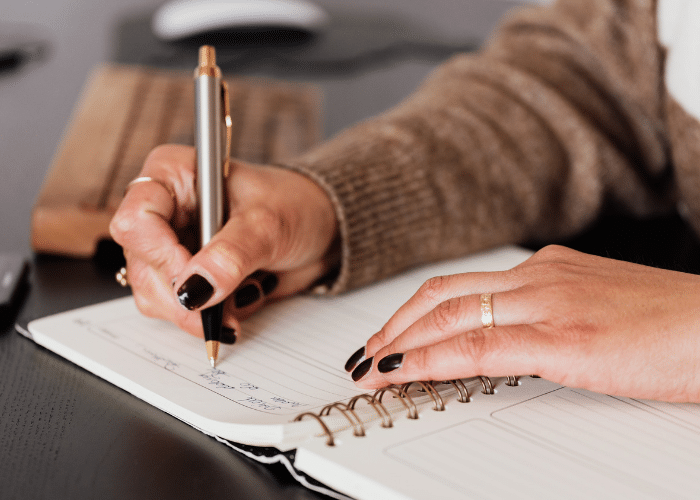
tip 2 | dump your thoughts onto paper or your favorite digital system
Put your thoughts onto paper or a spreadsheet. It can be a notebook of lists, a journal, or a diary. For the longest time, I had a steno pad that I just kept my to-do lists and brain dumps in.
I’m a paper and pen gal, but you may prefer a spreadsheet on your PC, tablet, or phone. Figure out the ‘vehicle’ that works best for you.
It’s crucial to write naturally with your mental flow. Toss out all grammar rules, spelling accuracy, and formal writing structures. All you need to do is grab a notebook, keyboard or piece of paper and continuously write down what runs through your brain—No periods or paragraphs necessary!
If this task is unfamiliar to you, begin by setting a timer for just 60 seconds. During that time, never allow your pen or pencil to pause. Even if you run out of thoughts, write, “I don’t have anything else to say right now.” Doing this helps to prompt more thoughts, while noncontinuous writing does nothing to keep your thoughts flowing.
After practicing this writing style for 60 seconds for a couple of days, increase the time bit by bit until you can write for several minutes or hours. You can write in one massive paragraph or make a bulleted list—whichever is more comfortable for you!
But again, pay attention to identify a common theme or issue that keeps popping up.
tip 3 | write with prompts.
To get your mind flowing, prompts may be necessary. Consider choosing one of the following mental clutter prompts to write or talk about and identify what’s really going on:
- I can’t stop thinking about …
- I keep getting frustrated with …
- I need to let go of …
- What’s one thing I can do today to feel more organized?
- What’s one thing I can do today to feel more in control of my life?
- I’d like to change ______ in my life.
- I don’t feel happy and healthy when I think about …
- I’m afraid that …
- What’s my definition of ‘being organized?’
- ______ makes me stressed and anxious.
- I want to get ______ done by.
- I need to get _______ done by.
tip 4 | keep a notebook and pencil on your nightstand for those thoughts that keep you up at night.
Identify which of these methods works best for you as a receptacle for all those thoughts in your mind.
let go or find a solution
Letting go is the next step to decluttering your mind and relieving your mental clutter. It’s the most vital and often the most challenging part of the process. Now that you’ve identified what’s littering your brain, it’s time to decide what to keep or toss. Consider what thoughts are beneficial and which ones are only holding you back.
Additionally, this is your chance to resolve the thoughts that are overwhelming but necessary. For instance, perhaps you are burdened with the many chores you’ve been putting off. In that case, simply tossing the thought out may not be the best way to get rid of it. Think about a solution to the problem instead. Maybe you need to set yourself a schedule to get the important things done. Or perhaps you need to reach out to a trusted person in your life who will gladly help you catch up.
I find that just the act of writing down a burden and identifying some solutions can help reduce the associated stress.
“Focus on the solution, not on the problem.”
Jim Rohn
If it is a negative or unhelpful thought that you can’t get out of your head, it may help to write down the thoughts you need to release and cross them out. Again, this step of the decluttering process may take some time. If you need to address just one or two thoughts over a few days, that’s perfectly fine! You’ll certainly thank yourself later!
manage your mental clutter
So, you’ve finally reduced the racing thoughts and overwhelming emotions tangled in your head.
Good for you! It’s hard work to declutter your mind, but it pays off!
Now, you need to figure out how to manage your negative thoughts and emotions so they don’t become cluttered again. We all struggle with a chaotic mind at times. Remember to be gentle with yourself and allow flexibility when experiencing stressful mental clutter in the future.
Sometimes, your brain becomes overloaded, no matter how consistent and careful you are with staying on top of your thoughts. It’s simply a part of being human. At least, now you know what to do to release the unnecessary and hindering thoughts. You’re off to a great start!
Here are ten tips to keep the mental clutter at bay:
- Be mindful of your time on social media or watching the news.
- Set aside a regular brain dump on a time frame that works for you. I try to look at my week ahead each weekend, write down everything that needs to be done, and then assign the date to get it done. Identify the three most important goals for the week and what you need to do to complete them. Schedule out the specific tasks.
- Set daily, weekly, and monthly goals to prevent getting behind on necessary chores and responsibilities.
- If you have a big task you dread and that takes up space in your head, break it down into bite-sized pieces. Set aside 1-hour increments for several days to dedicate to work on that task. I use my Alexa timer often for this.
- Avoid negative self-talk by immediately contradicting thought once it enters your brain. For example, if you suddenly think, “I will never get this done,” quickly turn the personal judgment around by saying, “I am capable of doing whatever I set my mind to” out loud.
- Set healthy boundaries with your family and co-workers; it is OK to say ‘no.’
- Voice what’s on your mind, rather than holding it in or suppressing the thoughts and emotions.
- Avoid having close relationships with pessimistic people or those who are constantly complaining.
- If memories from your past often weigh you down, try venting to a person you trust. Sometimes we just need to get things off of our chest and we just need a good ear to listen to us. Find that person with whom you can be each other’s ear.
- Practice daily self-care (meditation, mindfulness, setting your intentions, exercise, whatever brings you joy!)
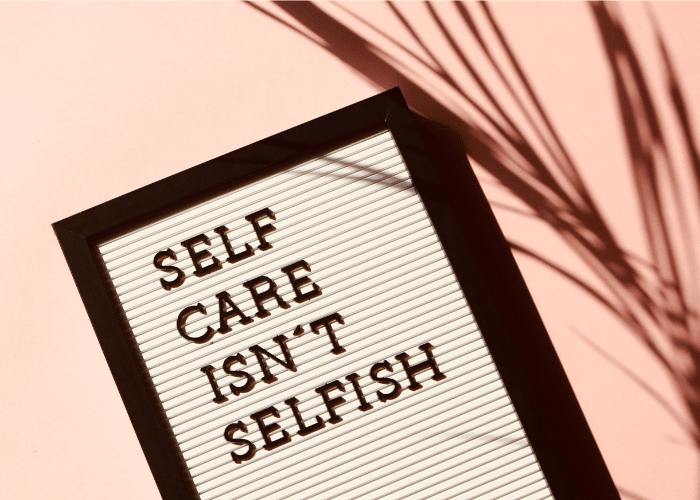
just scratching the surface
Wouldn’t it be lovely if this post was like the other declutter posts where we tick down a list, and at the end, our mind was decluttered and feeling fresh?
Sadly, we all know it is not that easy. It will be a process, but we hope this gives you some jumping-off points to ponder and explore.
Bookmark this page or pin the following image to refer back to this post on dealing with Mental Clutter.
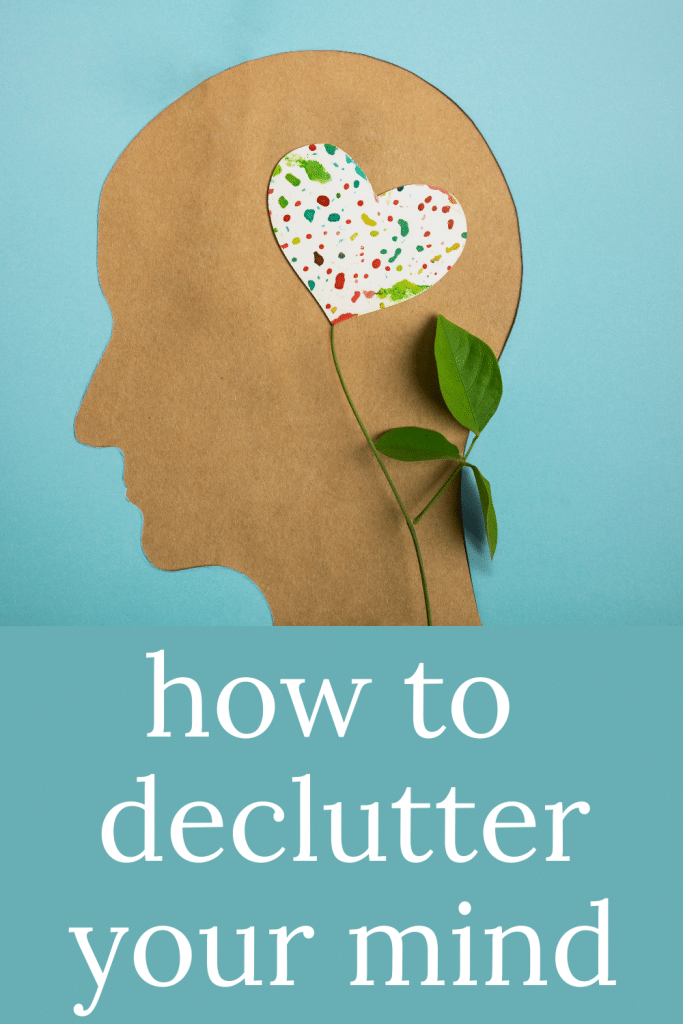
Thanks so much for spending a few minutes of your busy day with me!
To ensure you don’t miss future content, pop your email in the pale green box on the right or click here. I usually send one email weekly, so I won’t inundate your inbox. I’m sensitive to an overflowing email inbox!
We will only use your email address to send you emails, no more than 1-2 weekly. In addition, you will have access to my growing library of knit & crochet patterns and other printables. Check back often as this library will continue to grow. You can unsubscribe anytime by emailing me or clicking on the “unsubscribe” link at the bottom of all emails.
And you can access many of the products I refer to on my Nourish and Nestle Amazon Page. You can access it here.
So, if you’d like to participate in the ‘subscriber benefit’ action, simply subscribe to Nourish and Nestle here or use the form on the right sidebar. It’s slightly towards the top.
I have sent all my subscribers the link to the Subscriber Benefits Library. If you missed it or misplaced it, let me know.
Until next time…


